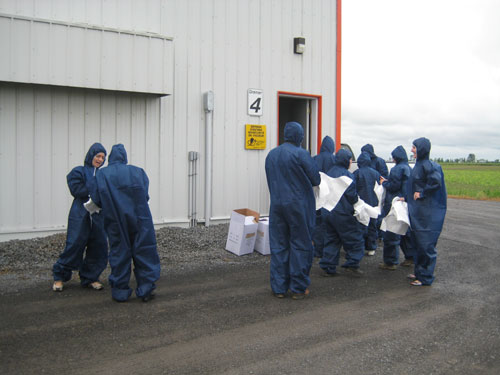Biosecurity is a series of measures to protect against the spreading of pests and diseases to humans and animal life. The measures taken are a combination of processes and systems that are put in place by bioscience laboratories and agricultural managers to prevent the use of dangerous pathogens and toxins. Biosecurity is something that all good producers practise, whether they are aware of it or not. If a producer has a boundary fence that keeps out neighbouring sheep, or refuses to buy sheep with obvious signs of foot rot, this is biosecurity in practice.
The main aim of biosecurity is to protect human health and to increase and protect agricultural produce through the prevention, control and management of biological risk factors.

The action farmers take on their farm is vital in stopping the introduction and spread of animal diseases in the UK. Diseases may not always be apparent, especially in the early stages and there are many ways disease can be introduced and spread through the UK:
- Farm animal diseases are mainly spread through animals moving between and within farms and the introduction of new animals to the farm
- If farmers are sharing vehicles, equipment and bedding between farms
- If there is direct or close contact with neighbours’ animals
- When an animal drinks from a contaminated river or stream
- When there are lots of visitors to the farm, including people, pets, vehicles and equipment
- The movement of people, especially workers, between and within farms
Some diseases animals have such as bluetongue, can only be spread by insects or contaminated veterinary equipment. Bluetongue disease is a non- contagious disease, mainly in sheep and goats. Major symptoms are high fever, excessive salivation, swelling of the face, lips and tongue, with a blue appearance. Not all animals develop signs, but those that do, their condition deteriorates rapidly.
Some diseases are zoonotic, meaning they can be transmitted between animals and humans, so good biosecurity can also reduce the risk of disease exposure to not only your workers, but members of the public who visit your farm.
Biosecurity measures
To prevent the spread of any diseases you should take the following steps;
- Don’t bring infection onto your farm, or spread it around the farm, on your clothes, footwear or hands
- Where possible, limit and control farm visitors, people and vehicles
- Keep access to the farm, parking areas, yards and feeding areas clean and tidy
- Have pressure washers, brushes, hoses, water and disinfectant available and make sure your visitors use them
- Introduce a pest control programme
- Fence of streams and rivers- supply fresh, clean drinking water in troughs
- Know the health status of any animals you are buying or moving
- Ensure the livestock identification and record keeping is accurate and up to date
- Dispose of fallen stock (dead) properly
- Be vigilant to spot any signs of disease amongst your animals, and report suspicions of notifiable diseases to the animal and plant health agency (APHA) as soon as possible
Ensure to keep livestock away from freshly spread slurry
Fred Homes
